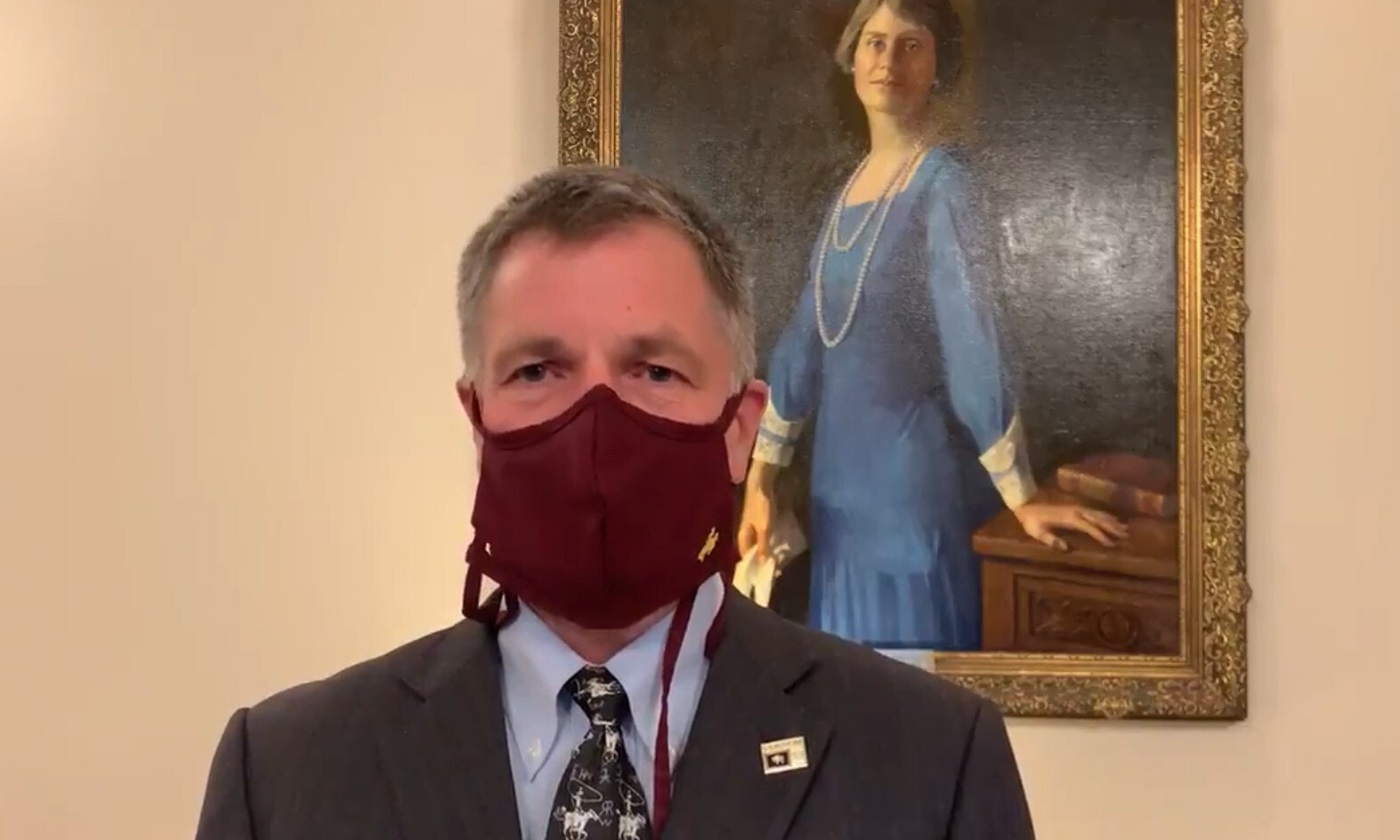By Nick Reynolds, WyoFile
In normal years, the first day of the legislative session in the Wyoming Capitol has certain hallmarks.
Lawmakers smile from their seats, applauding speeches from leadership. School children, lawmakers’ families and sharp-eyed lobbyists crowd the galleries to watch the first “easy” day of the legislative session.
In the hallways, hundreds of footsteps reverberate from the marble checkerboard floors. In one well-loved tradition, former lawmaker and Sweetwater County Democrat Stan Blake would yell out “play ball!” after the Pledge of Allegiance in a refrain that would echo throughout the House floor.
But the last time Blake made his utterance, and the last time those familiar scenes played out, was before COVID-19 arrived.
This year, another scene unfolded. The typically crowded galleries sat mostly empty, just a handful of masked staff and onlookers to bear witness. Blake — along with a handful of other long-serving lawmakers — had been swept out in an election in which the pandemic played a prominent role, leaving other members to take up the tradition instead.
Few children roamed the halls, and just a handful of chairs scattered through the once-packed committee rooms were occupied, with plexiglass barriers separating them from the lawmakers at the front of the room.
Lobbyists, members of the public and journalists could no longer send slips of paper to legislators on the floor to arrange a meeting in the hallway — a longstanding practice. They were instructed instead to text or email the lawmakers directly.
In normal years, an electricity hums through the air. But as Wyoming and the world at large entered the second spring of the COVID-19 pandemic, it was hard to ignore that energy was missing in the Wyoming Capitol, and even harder to ignore the cloud of a virus hanging over the proceedings.
In the House chamber, the Rev. Bob Thomson opened the session with a prayer for those who had contracted the virus, those the virus had taken away, for frontline workers and for the vaccines that are hastily being administered throughout the state — as well as for the health and strength of the Legislature itself as it begins a fast-paced, month-long session.
As the House began to work through bills, Gov. Mark Gordon — who himself contracted COVID-19 in November — rehearsed his State of the State address in the Historic Supreme Court Chamber as the rest of his staff isolated from one another after being exposed to a staffer in the office who had recently contracted the virus.
Members of the Senate Appropriations Committee gently joked with Sen. Drew Perkins, R-Casper, about his mobility around the Capitol following his own serious bout with the virus earlier this year. During the interim, the virus caused some lawmakers to miss meetings, including Sen. Bo Biteman, (R-Ranchester) while others — like Sen. Jim Anderson, (R-Casper) — worked through interim committee work from home while grappling with symptoms. One House lawmaker— Rep. Roy Edwards, (R-Gillette) — died from complications of the virus in November.
The virus had made its presence felt in other ways, including in the dynamic of the Legislature. Lobbyists who once relied on in-person relationships and working closely with the legislators on paper amendments have had to rely instead on video meetings, phone conversations and other measures that have robbed their discussions of nuance and personality. Complicating things further is the fact that much of the Legislature is new this year.
But in all those virtual meetings — and despite the endless tech challenges like reminding people to unmute themselves — the lawmaking has plodded forward.
“From my perspective, we’re on day 55 of the legislative session,” said Jerimiah Rieman, the executive director of the Wyoming County Commissioners’ Association. “The reality of the remote session committee meetings is that what looks like downtime to everybody on the outside of the process really isn’t downtime. You’re working different bills and amendments over the course of weeks, and we’ve been doing that since January. This is just the in-person part of that session.”
The virus’ presence has also seeped into the policies the body is considering. As of this writing, seven bills had been filed looking to reform the scope of Wyoming’s public health orders. One bill sought to politicize the position of the state health officer. And the state Legislature prepared to ratify tens of millions of dollars in budget cuts drafted in response to the crisis the pandemic had wrought.
“It takes a strong mind to know the balance between your values, to know the values of your neighbors, know the values that represent the state of Wyoming,” Rep. Mike Greear, (R-Worland), said in a speech on the House floor Monday morning. “It takes a strong mind in this political environment. It takes a strong mind not to listen to the loudest voices. Listen to that inner voice.”
That advice holds more weight than ever now, several lawmakers noted, as Wyoming prepares for deep cuts to its budget that — in many cases — will hurt back in their home districts. In other remarks, members of leadership preached unity in times of division.
At a time of deep cuts, Rep. Cathy Connolly, (D-Laramie), said in her own speech, the Legislature’s obligation to its citizens involves providing good healthcare and a robust education system. It means broadband access, infrastructure and a corrections system that accomplishes what it intends to do. This session, many of those programs now find themselves on the chopping block.
Achieving that tricky balance, she said, would require all factions working together to “build a Wyoming our neighbors don’t want to leave.”
“As state lawmakers who are duly elected, what’s our response when our people ask for help?” Connolly asked. “I think we need to listen.”
But it also requires vision. In an address to members of the House, newly-elected House Speaker Eric Barlow, (R-Gillette) — who, on the floor, announced his retirement after the conclusion of his current term — said he had read 10 speeches by former speakers, only to find similar themes running through all of them. Education, economic diversity, the need for new revenue, the budget, infrastructure, health care, individual liberties, “They keep reoccurring,” Barlow said.
It now falls on the 66th Legislature to come up with its own solutions. Which survive and which fail will become apparent in the coming weeks.
“Some will rise. Some will fall. Some will be gut-wrenching,” Barlow said. “So let’s continue to listen, learn and consider possibilities and, most important, take care of each other.”





